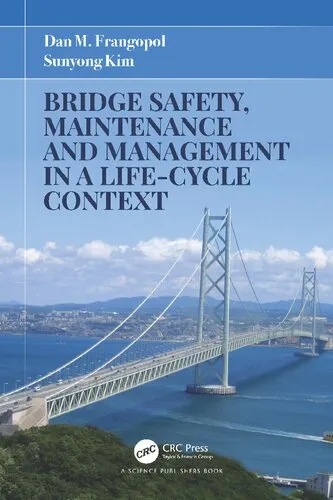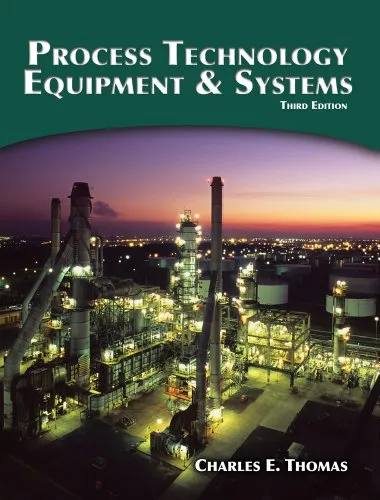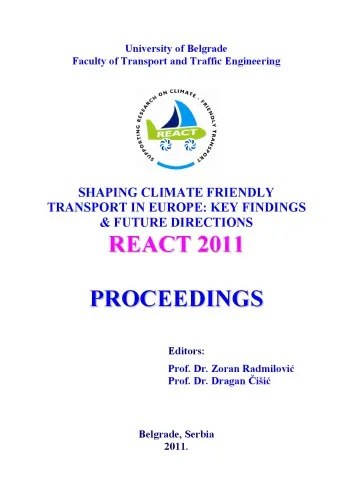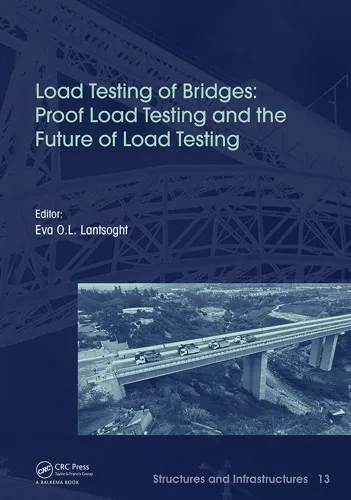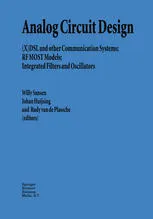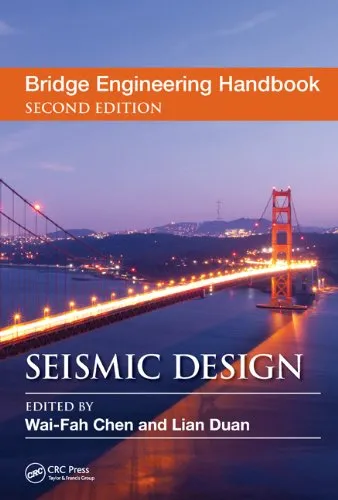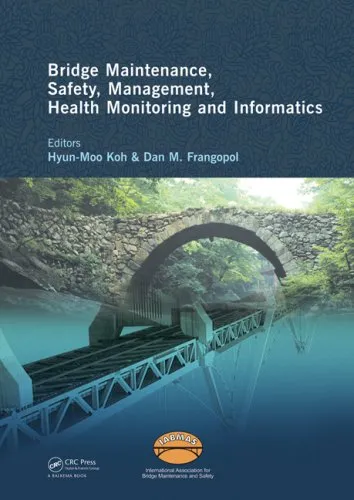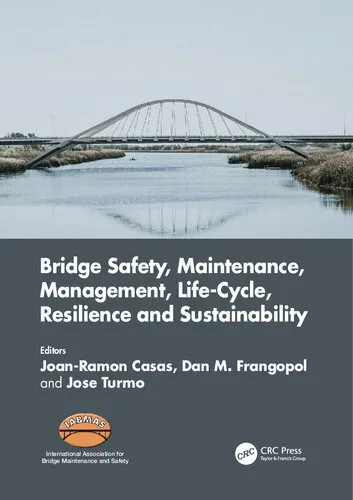Bridge Safety, Maintenance and Management in a Life-cycle Context
4.5
بر اساس نظر کاربران

شما میتونید سوالاتتون در باره کتاب رو از هوش مصنوعیش بعد از ورود بپرسید
هر دانلود یا پرسش از هوش مصنوعی 2 امتیاز لازم دارد، برای بدست آوردن امتیاز رایگان، به صفحه ی راهنمای امتیازات سر بزنید و یک سری کار ارزشمند انجام بدینکتاب های مرتبط:
معرفی کتاب
کتاب 'Bridge Safety, Maintenance and Management in a Life-cycle Context' اثری برجسته از Dan M. Frangopol و Sunyong Kim است که به بررسی جامع ایمنی، نگهداری و مدیریت پلها از دیدگاه چرخه عمر میپردازد. این کتاب با استفاده از اصول مهندسی سازه، تحلیل ریسک، و مدلسازی Life-cycle، راهکارهای پیشرفتهای برای مواجهه با چالشهای روزافزون زیرساختهای پل ارائه میدهد. در دنیای مدرن که اهمیت نگهداری و افزایش طول عمر سازهها بیشتر از همیشه احساس میشود، این کتاب نقش کلیدی در ارائه دانش و راهبردهای عملی ایفا میکند.
خلاصهای از کتاب
محتوای این کتاب به طور کامل به جنبههای مختلف ایمنی، نگهداری و مدیریت موثر پلها اختصاص دارد. نویسندگان با رویکردی سیستماتیک و علمی، مفاهیم پایهای و ابزارهایی را ارائه میدهند که برای اطمینان از عملکرد بلندمدت پلها ضروری است. این کتاب بر اساس چارچوب Life-cycle Cost Analysis (LCCA) تألیف شده است و تأکیدی خاص بر بهینهسازی هزینهها و برنامهریزی تعمیرات در طول زمان دارد.
کتاب شامل مجموعهای غنی از موضوعات نظیر ارزیابی آسیبها، طراحی سیستمهای مقاوم به خرابی و مدیریت جامع ریسک است. همچنین ابزارهای پیشرفتهای مانند Simulation Models و تکنیکهای Probabilistic Analysis برای تحلیل دادههای مرتبط با پلها ارائه شده است. تمرکز اصلی کتاب بر دستیابی به توازن بین ایمنی، کارایی اقتصادی و پایداری در مدیریت زیرساختهای پلها است.
نکات کلیدی
- رویکرد مبتنی بر چرخه عمر برای تحلیل هزینهها و سودها
- مدیریت ریسک و استفاده از روشهای Probabilistic برای کاهش خطرات ساختاری
- بهینهسازی نگهداری و تعمیرات پلها بر اساس مدلهای پیشرفته
- یکپارچهسازی ابزارهای پیشرفته مهندسی برای طراحی و ارزیابی عملکرد
- بررسی مثالهای واقعی و دادههای میدانی برای درک بهتر موضوعات
نقل قولهای معروف از کتاب
"Safety and long-term performance of bridges are critical components in maintaining the integrity of transportation systems worldwide."
"Life-cycle management is no longer an option; it is a necessity for infrastructure longevity."
چرا این کتاب مهم است؟
با توجه به افزایش سن زیرساختهای حیاتی در سراسر جهان و فشار فزاینده بر بودجههای دولتی برای تعمیر و نگهداری، نیاز به ابزارها و رویکردهای جدید در مدیریت پلها بیش از پیش احساس میشود. این کتاب یکی از منابع پیشرو در زمینه مدیریت پلها است و میتواند برای مهندسان عمران، پژوهشگران، و مدیران پروژه منبعی ارزشمند باشد.
علاوه بر پوشش مبانی نظری، کتاب شامل مطالعات موردی از پروژههای واقعی است که این موضوع را برای خوانندگان قابل لمس و کاربردی میکند. اهمیت این اثر در تأکید آن بر Sustainability و رویکردهای نوآورانهای است که میتواند به بهبود زیرساختهای حملونقل کمک کند.
Welcome to Bridge Safety, Maintenance and Management in a Life-cycle Context, a comprehensive resource that delves deep into the multidisciplinary and systematic approaches essential for ensuring bridge safety and reliability throughout their life span. This book combines cutting-edge research, practical engineering insights, and sustainable methodologies to equip engineers, managers, and researchers with the tools and knowledge necessary to manage bridge infrastructure efficiently.
Detailed Summary of the Book
The book explores bridge safety, maintenance, and management from a life-cycle perspective, which considers the entirety of a bridge’s existence, from design and construction to operation, maintenance, and eventual decommissioning or replacement. Through practical examples, state-of-the-art methodologies, and advanced modeling techniques, readers will develop a thorough understanding of how to assess risks, allocate limited resources effectively, and implement preventative maintenance measures to ensure long-term structural safety.
This text emphasizes the importance of integrating multidisciplinary approaches, including structural engineering, risk management, decision science, and sustainability, into bridge management practices. By introducing concepts such as life-cycle cost analysis, reliability-based design, and performance-based methods, the book provides actionable frameworks and tools for optimizing decisions related to resource allocation, durability, and adaptation to environmental challenges.
Each chapter is carefully structured to build upon key principles while offering hands-on techniques for applying theory to real-world challenges. Topics such as bridge health monitoring, maintenance scheduling, risk assessment, and sustainable degradation modeling are treated with precision and clarity, making the book a perfect guide for both academics and practitioners.
Key Takeaways
- The life-cycle perspective is critical in managing the safety, reliability, and sustainability of bridge structures.
- Effective bridge management requires balancing technical, economic, environmental, and social constraints to ensure optimal performance.
- Bridge maintenance strategies based on risk-informed decision-making can prolong service life while minimizing costs.
- Integration of advanced sensor technologies and health monitoring systems is key to predictive maintenance and early detection of issues.
- Structural and operational uncertainties must be rigorously accounted for in robust bridge design and management frameworks.
Famous Quotes from the Book
"A bridge is much more than a physical structure—it is an embodiment of connection, safety, and resilience. To manage its lifecycle effectively is to honor its role in sustaining society."
"The success of any bridge management strategy lies in its ability to predict failure before it occurs, not merely react to it."
"Bridges are markers of progress, and their safety lies not only in how they are built but in how they are cared for across generations."
Why This Book Matters
Modern infrastructure systems—particularly bridges—play an indispensable role in connecting communities, fostering economic development, and enhancing quality of life. However, with age, these structures face inevitable deterioration, often exacerbated by increasing traffic volumes, extreme environmental conditions, and limited maintenance budgets. This book matters because it addresses these pressing challenges holistically, offering actionable strategies to ensure the longevity, safety, and sustainability of bridge structures.
Furthermore, throughout its chapters, the book empowers readers with evidence-based methods and techniques that combine traditional structural engineering principles with contemporary innovations, such as sensor technologies, AI-driven analysis, and probabilistic modeling. This combination not only ensures structural safety but also supports efficient decision-making that optimizes life-cycle costs and minimizes environmental impact.
Finally, this book serves as an essential guide for practitioners, managers, students, and researchers in civil and structural engineering seeking to elevate their understanding of bridge maintenance in a framework that integrates engineering precision with social responsibility.
دانلود رایگان مستقیم
شما میتونید سوالاتتون در باره کتاب رو از هوش مصنوعیش بعد از ورود بپرسید
دسترسی به کتابها از طریق پلتفرمهای قانونی و کتابخانههای عمومی نه تنها از حقوق نویسندگان و ناشران حمایت میکند، بلکه به پایداری فرهنگ کتابخوانی نیز کمک میرساند. پیش از دانلود، لحظهای به بررسی این گزینهها فکر کنید.
این کتاب رو در پلتفرم های دیگه ببینید
WorldCat به شما کمک میکنه تا کتاب ها رو در کتابخانه های سراسر دنیا پیدا کنید
امتیازها، نظرات تخصصی و صحبت ها درباره کتاب را در Goodreads ببینید
کتابهای کمیاب یا دست دوم را در AbeBooks پیدا کنید و بخرید
1294
بازدید4.5
امتیاز0
نظر98%
رضایتنظرات:
4.5
بر اساس 0 نظر کاربران
Questions & Answers
Ask questions about this book or help others by answering
No questions yet. Be the first to ask!
